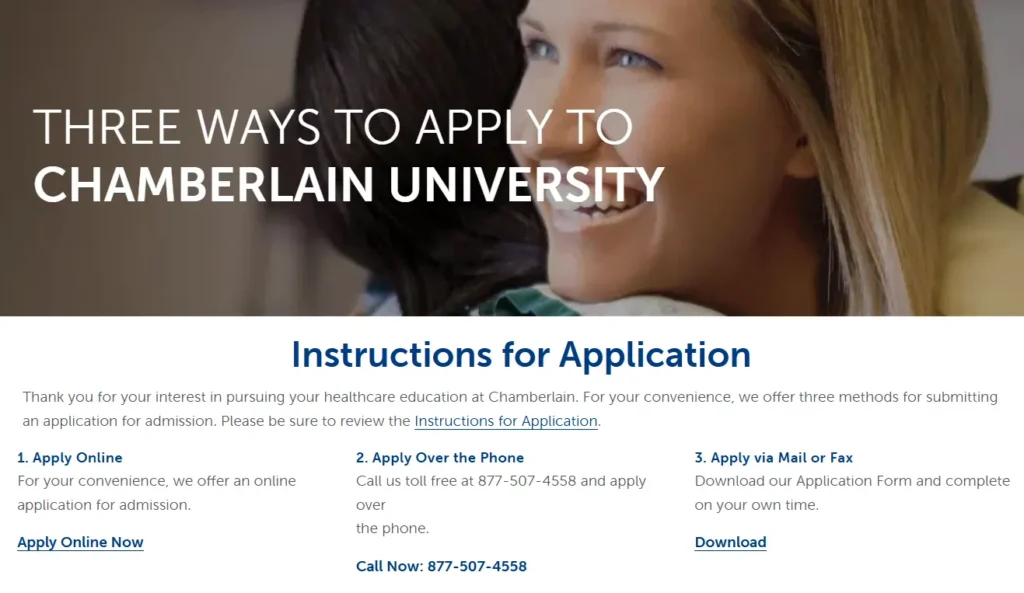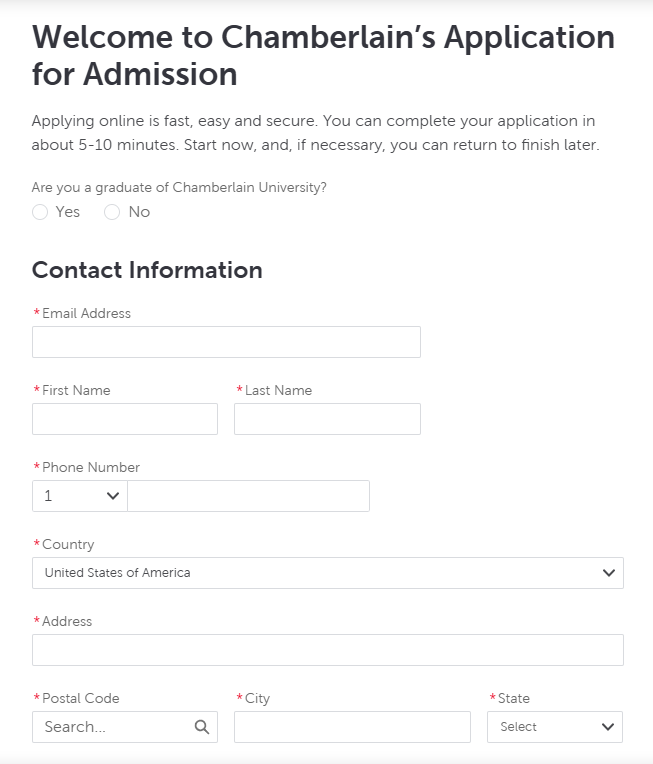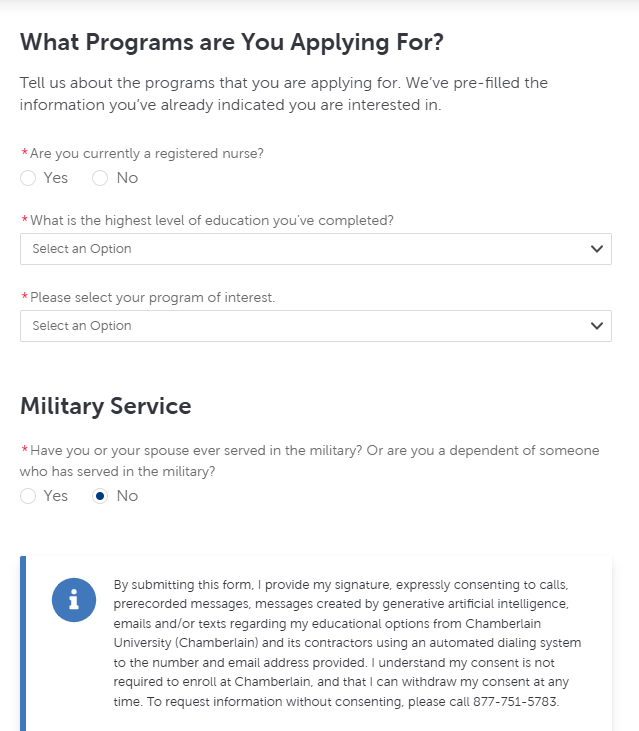You can apply to Chamberlain University online at any time, so taking the next step toward your nursing career is pretty straightforward. The process is simple. You’ll need a high school diploma and at least a 2.75 GPA to get started. A complete Guide to Requirements and Submission Process of Chamberlain Application.
There’s a non-refundable application fee when you submit your materials. If you’re not sure when to apply or have questions, Chamberlain offers support and resources to help you out.

Knowing what to expect can make the application process feel less stressful. It’s always easier when you have a little guidance.
Admissions Process at Chamberlain University
To apply, you’ll complete some key steps and meet set requirements. Be aware of deadlines and check your eligibility, especially if you’re an international student.
Step-by-Step Application Guide
Start your application online at the Chamberlain website. Fill out the application form with your basic info, education history, and the program you’re interested in.
After you submit, you’ll need to send in your transcripts. You can upload them online or mail or fax them if needed.
Next up, you’ll have an interview with an admissions representative. This chat helps Chamberlain get to know your goals and see if their program is right for you.
If you’re applying through a partnership like Guild, double-check that your program choice matches on both applications. International students must also provide proof of English proficiency and other documents specific to non-U.S. applicants.
Make sure you’ve got all your paperwork lined up to avoid any delays.

Admission Requirements
The main requirement for undergrad admission is a high school diploma or equivalent, plus a minimum 2.75 GPA. If your GPA is lower, you might still be considered, but you’ll need to meet extra criteria.
Required Documents:
- High school transcripts
- Completed application
- Interview with an admissions advisor
If you’ve attended college before, send your college transcripts too. International students need to show proof of English skills, like TOEFL or IELTS scores, and may need to provide visa and passport copies.
If you don’t meet the minimum requirements or miss documents, admission is unlikely.

Application Deadlines
Chamberlain runs on rolling admissions, so you can usually apply for the next available term. Typical deadlines are 2-4 months before classes start.
Check the website or ask your admissions rep for exact deadlines for your program and campus. International applicants should apply early—collecting documents, getting test results, and securing a visa can take weeks.
Applying ahead of time helps you avoid last-minute headaches.
Overview of Chamberlain Applications
Chamberlain University has a clear process to help you apply for healthcare degree programs. The application is built to guide you through every step and make sure you’ve got what you need.
Key Features for Applicants
You can apply online or over the phone. Start by filling out the detailed application and paying the non-refundable fee.
Provide your academic records and be ready for an interview with an admissions rep. After you’ve submitted everything and finished your interview, you’ll usually hear back in about a month.
Key Steps:
- Complete the application form
- Submit transcripts and records
- Attend an admission interview
- Wait for review and decision
The process checks if you meet all the prerequisites for your chosen program. Keep tabs on deadlines and make sure you send in all requested documents to avoid hold-ups.
Benefits for Healthcare Professionals
Applying to Chamberlain helps healthcare professionals move forward in their careers. You get access to accredited nursing and health programs, and the application focuses on your qualifications.
There are opportunities to grow into nursing, healthcare admin, or related fields. Chamberlain’s programs are designed to help you handle real-world challenges and meet today’s healthcare standards.
With flexible start dates and year-round applications, you can apply when it fits your life. The admissions team is there to guide you and make the process a bit less overwhelming.
Chamberlain also supports credit transfers and helps you figure out state and program requirements. That makes it easier to move into advanced or specialized roles down the line.
Programs and Academics
Chamberlain University focuses on preparing you for careers in nursing and healthcare. There’s a range of degree options, professional development courses, and ways to keep learning.
Nursing Degree Options
You can pick from several nursing programs depending on your background and goals. The Bachelor of Science in Nursing (BSN) is available online or on campus.
If you’re already an RN, the RN to BSN program lets you earn advanced qualifications. For those looking to go further, there are graduate programs too.
The Master of Science in Nursing (MSN) offers tracks like nurse educator and nurse executive. There’s also a Doctor of Nursing Practice (DNP) focused on leadership and clinical practice.
Classes start every eight weeks, which gives you some flexibility to balance studies and life.
Professional Development Programs
Chamberlain offers professional development to help you build skills and move ahead in your field. These include short courses, workshops, and seminars on current healthcare topics.
You get to learn from instructors with industry experience. Both nursing students and working professionals can join these programs, which can add valuable credentials to your resume.
Continuing Education Opportunities
Continuing education matters if you want to keep your nursing license or specialize. Chamberlain’s nursing continuing professional development (NCPD) courses often meet state license renewal requirements.
Topics include patient safety, leadership, and clinical care. You can take these courses online for convenience.
If you want to focus on a specific area, there are certificate options too. That way, you can stay up-to-date with the latest in nursing and healthcare.
Student Support and Campus Life
Chamberlain University gives you lots of resources to help you succeed. There are also plenty of ways to get involved in campus life, explore interests, and get personal support.
Student Services
You’ve got access to student services for both academic and personal needs. Academic advisors help you with degree planning and course selection.
For financial aid questions, reach out through the My Chamberlain student portal by clicking “Support” in the menu. Career services offer resume feedback, job search tools, and interview tips.
Tutoring, writing help, and skill workshops are there if you need extra support. Counseling services give confidential help if you’re facing challenges. Student support teams answer questions and keep you on track.
Campus Tours
Campus tours let you check out classrooms, labs, study spaces, and common areas. Schedule a tour with an admissions rep to get a feel for the environment.
You can ask questions, meet staff, and see if Chamberlain is a good fit. If you can’t visit in person, some campuses offer virtual tours, so you can look around online.
Admissions staff can also tell you about events and open houses.
| Tour Type | How to Access | What’s Included |
|---|---|---|
| In-person | By appointment | Guided walkthrough, meet staff, view labs and classrooms |
| Virtual | Online or scheduled | Digital campus map, video tours, Q&A sessions |
Student Organizations
You can join student organizations focused on academics, leadership, health, and service. These groups help you meet classmates, make friends, and learn new skills outside class.
Student Organizations
Organizations often host events, speaker series, and workshops. Joining can help you get more involved and build your network.
Check with the student life office or the website for a list of groups and how to join. Getting involved really does support your academic and personal growth.
Accommodation for Learning Disabled
If you have a learning disability, Chamberlain offers accommodations to help you succeed. You’ll need documentation from a qualified professional to apply.
Accommodations might include extra test time, note-taking help, or assistive tech. Academic support advisors are available to answer your questions and help you set up a plan.
You can ask about these services anytime—just reach out to student services or check the university portal. All requests stay confidential and follow privacy laws.
Financial Aid and Costs
Planning for Chamberlain means thinking about tuition, fees, and how to pay. You’ll want to know the costs for classes and what financial aid or scholarships you can get.
Tuition and Fees
Tuition is $635 per credit hour for most nursing programs. There’s also a $60 application fee when you apply.
Each session, you’ll pay a $200 Student Services Charge. Every course adds a $100 Course Resource Fee. These numbers are for 2024-2025 and could change.
Active military and veterans may get lower tuition rates. Don’t forget to budget for books and supplies—they’re extra. Here’s a quick summary:
| Cost Type | Amount |
|---|---|
| Application Fee | $60 |
| Tuition (per credit hour) | $635 |
| Student Services Charge | $200 per session |
| Course Resource Fee | $100 per course |
Financial Aid Options
You can apply for federal financial aid, including Pell Grants and federal student loans, by filling out the FAFSA. Chamberlain also takes state grants if you qualify.
Some options include subsidized and unsubsidized loans. A Student Finance Advisor can walk you through your choices—call 877-751-5783 for help.
Payment plans let you pay tuition in smaller amounts each term. Some employers offer tuition reimbursement for healthcare education too.
Scholarships for Healthcare Students
Chamberlain gives out scholarships for new and current students. These can be based on grades, financial need, or career goals in nursing and healthcare.
Outside groups and nursing associations also offer scholarships for healthcare students. Look on scholarship sites, through community foundations, or ask the school’s financial aid office.
Apply early—some scholarships have limited funds or deadlines. Your academic record, volunteer work, or minority status might help you qualify for extra support. These resources can really help reduce your out-of-pocket costs.
Credentialing and Certification Pathways
It’s important to understand how certification and credentialing work at Chamberlain. Knowing what certificates of completion mean and which groups handle credentialing helps you plan your next steps after graduation.
Certificate of Completion
When you finish a Chamberlain certificate program, you get a Certificate of Completion. This shows you’ve met all course requirements and learned the topics covered.
Most Chamberlain certificate programs, like nursing and public health, are fully online. You complete all coursework and assessments before earning your certificate.
This certificate doesn’t mean you’re nationally certified to work in a specific specialty. It simply proves you finished an educational program that can help you meet professional standards or prep for future credentialing exams.
Credentialing Organizations
After you get your Chamberlain Certificate of Completion, you might need credentials from groups like the American Nurses Credentialing Center (ANCC). These organizations set standards for nursing and issue certifications you may need for certain jobs.
Credentialing usually asks for proof of education, exam scores, and sometimes work experience. The ANCC is a big one, especially if you want to become a nurse practitioner or aim for advanced roles.
Not every certificate program leads straight to credentialing. Always check with the specific organization about degrees, clinical hours, or exams. It’s worth double-checking, just so you know what’s next after graduation.
Center for Professional Excellence
Chamberlain University’s Center for Professional Excellence offers opportunities for growth in healthcare careers. You’ll find practical courses, training, and resources to help you advance your expertise or meet licensure needs.
Programs for Healthcare Professionals
You can access a variety of courses made for nursing and other healthcare fields. These programs focus on career advancement, building new skills, and keeping your credentials current.
Training options include:
- Short Courses: Cover key healthcare topics and new tech.
- Certification Prep: Helps you meet continuing education or licensure requirements.
- Flexible Learning: Many programs are online, so you can work at your own pace.
Whether you’re new to healthcare or a seasoned pro, these programs target both personal and professional growth. Course topics get updated often to match changes in healthcare standards and practices.
Support Resources
The Center for Professional Excellence gives you several resources to help you succeed. You’ll find academic support through online tools, faculty access, and quick tech help.
If you have questions about programs or career moves, dedicated advisors can guide you. Resources also include:
- 24/7 Online Assistance: Get help whenever you need it.
- Study Materials: Easy-to-follow guides and practice tests.
- Community Forums: Connect with peers for advice or just some encouragement.
Support is really about helping you balance education with work and life. Everything’s designed to be accessible, whether you’re on campus or learning online.
Frequently Asked Questions
If you’re thinking about applying to Chamberlain University, you probably have some questions about requirements, deadlines, and recognition. Here’s a quick rundown to help you get started.
